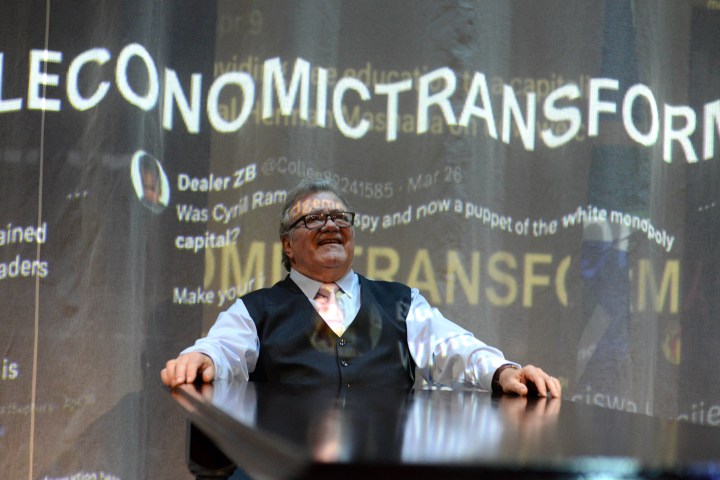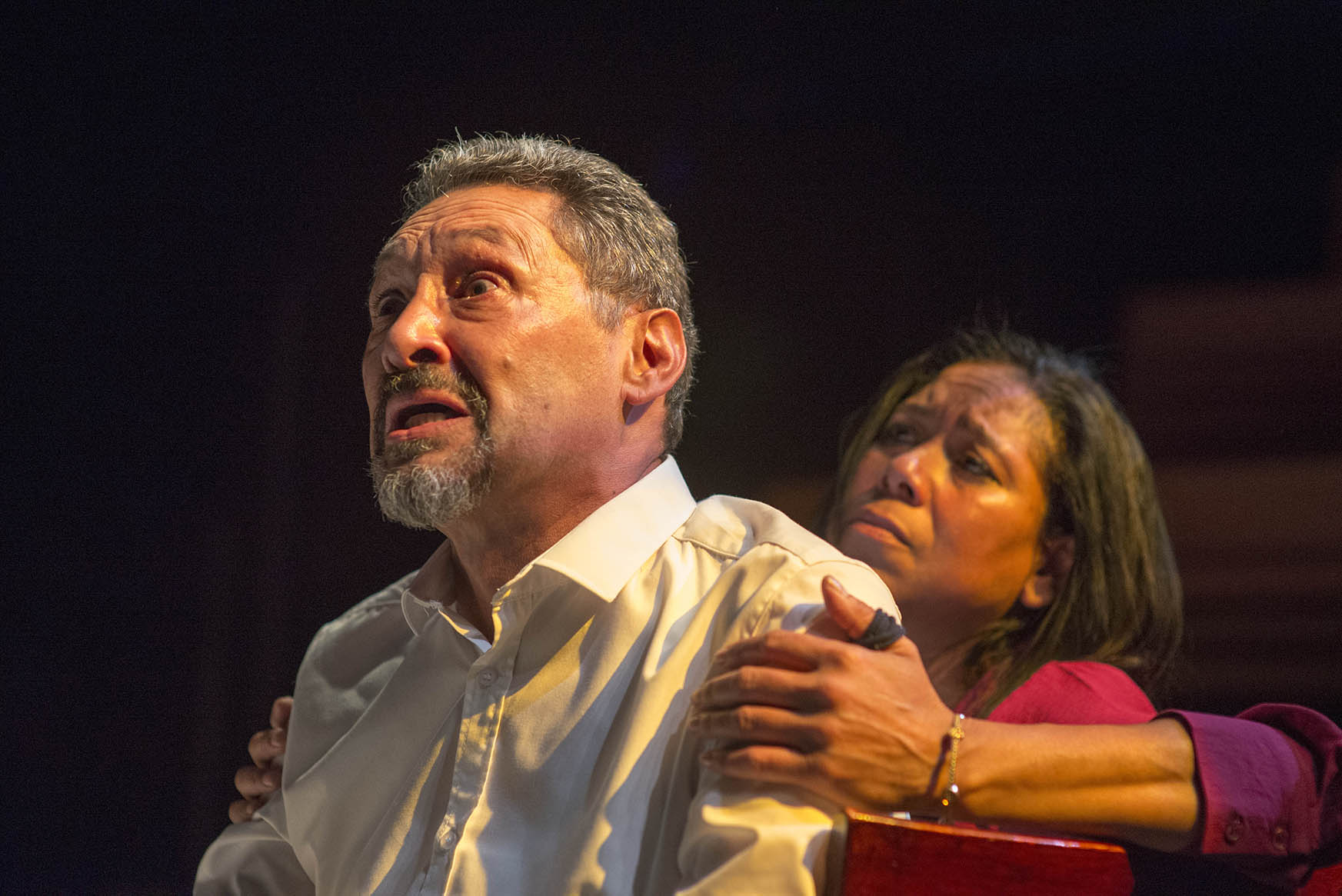THE INTERVIEW
Memorialising State Capture: Political analyst Richard Calland brings the great Gupta heist to the stage

Sensing that the country was failing to learn lessons from State Capture – meaning that the work done to defend democracy would be wasted – political analyst Richard Calland wrote The Brothers, Number One and a Weekend Special, now playing at The Market Theatre.
For years, political analyst and writer Richard Calland has watched the unruly mess of South African politics flow before him from his perch at Parliament (before the building burnt down, of course).
Few people in the country have had more experience observing the inner workings of government; few people have spent more time considering how the various elements converge — or, more often, don’t. And as bad as things may have been on a normal day, they only got worse during the period of State Capture, when Jacob Zuma’s fetid mafia regime tried everything it could to subvert the mechanics of governance in the service of a narrow syndicate, led in spirit by the notorious Gupta brothers.
During the pandemic, Calland had an idea: Why not do something with all this raw material. That something has become a play, currently in production at The Market Theatre. It’s called The Brothers, Number One and a Weekend Special. It’s about, well, everything.
Daily Maverick recently spoke with Calland about how, of all things, he hoped to capture State Capture for the stage, and what he hoped the work would achieve. The interview has been edited for length and clarity.

The Brothers, Number One and a Weekend Special. David Dennis as Uncle and Astrid Braaf as Journalist.
(Photo: Suzy Bernstein)
DM: What inspired you to write this project? What was the driving impetus?
Calland: It was a mixture of personal, professional and political reasons. The personal reason was, frankly, to experiment with another writing genre to see if I could succeed with a creative writing project, having written prose and nonfiction all my life.
The professional reason was, I think, based around the idea that this country tends to move on very fast from things. State Capture was something that was really significant. And yet there was a real danger, it seemed to me, that we moved on too fast from it, the lessons not learned, not digested. And then all the work that was done to defend democracy was kind of wasted. It was a huge effort to protect the institutions and the rule of law. And I think, although full accountability hasn’t happened yet, that it was a significant effort to defend public democracy from private state capture.
I suppose the political reason was about trying to make art that will memorialise that historical moment in a creative way, and which will capture people’s attention, stimulate them, and communicate these important messages through a different channel. Because I think part of the fatigue, not specific to State Capture, but more generally, is that people are struggling at the moment to deal with big stories, like climate change, or State Capture.
So the challenge, and it’s a shared challenge for journalists, commentators, analysts and even academics, is how to communicate this complexity in a way that doesn’t kind of drive people away. And art at its best can cut through that because it can entertain and stimulate in a way that perhaps other forms of communication can’t.
DM: One thing I’ve long been fascinated by is the fact that outside of liberation, we tend not to mythologise these massive historical milestones in our democratic journey. There’s this tendency to move from event to event almost like a goldfish, and our memories get wiped with each new incident. Was this in part why you wanted to stop and contemplate?
Calland: Yeah, I noticed that. The rich material available to us is fantastic for columnists and for satirical writers and cartoonists. But there’s an endless supply of rich material that the world of art and theatre wasn’t keeping pace with. So you’ve got some work that is kind of satirical about politics. But my work isn’t satire. It’s funny in places. It does make people laugh. But it’s got a serious purpose, serious intent. Which is, I don’t know about mythologising but certainly to memorialise what we’ve been through.

David Dennis in the production of The Brothers, Number One and a Weekend Special. (Photo: Suzy Bernstein)
DM: I suppose people like you and I are weird, if not perverted in a certain sense, where we will sit down and read three massive doorstop Zondo Commission reports. And I remember that it felt like reading a novel. There’s this massive, sweeping historical insight into who we are, into how the gangster state functions. It felt like a Mario Puzo novel, it felt like The Godfather. So, I’m wondering what your sense was when reading the reports, and how it inspired you?
Calland: When I read the volume on [the railway parastatals] Transnet and Prasa, it begins with the notion of racketeering. And the word “racketeering” takes one back to the 1920s in Chicago, to Al Capone. That was the image in my mind. And you’re right, it felt like The Godfather. And it’s gripping, if you like that sort of stuff. Not all of it, but in the end much of the Zondo Report was quite clearly written. And that was a hell of a mission and a hell of a mess.
And, of course, for your average citizen, it’s too much, it’s overwhelming. They needed to produce a really snappy executive summary, but they haven’t. It’s almost like you need a bite-sized 3,000 word kind of thing that just pulls it all together. But maybe that wouldn’t do justice to it. How many people have read Zondo? I sometimes doubt if anyone has read all of it, other than [Daily Maverick superstar] Ferial Haffajee. People like you and I have read large chunks of it. Maybe not even Chief Justice Zondo himself has read the whole thing?
I think there’s a contrast here with, for example, the Argentinian Truth and Reconciliation Report [detailing the decades-long military junta], which was titled Never Again [Nunça Mas in Spanish, with a stunning prologue by Ernesto Sabato]. And it was a bestseller. People bought it, it was part of the political culture of Argentina.
DM: I’m also thinking of the Warren Commission [the investigation into the John F Kennedy assassination]. I’m also thinking of the 9/11 Commission Report, where these were packaged into paperbacks that you could buy at an airport. And they were consumed. To me, that seems what democratic engagement is about. It’s taking these exegeses of us at our worst moments and working through it, reading it, examining it.
Calland: In the end, that’s my hope with the play. And that others will take this up. So, the more people that can get exposed to this stuff, especially from outside the “Beltway”, you know, outside our political bubble, the better for democracy. Now, how many people will go to the Market Theatre to see the play? Well, I know already that there are people going there who aren’t necessarily always into politics, and hopefully they will find it entertaining, as well as kind of informative and analytically useful.

The Brothers, Number One and a Weekend Special. Michael Richard as Tim and Melissa Haiden as Virginia. (Photo: Suzy Bernstein)
DM: South Africans have a tendency to learn from success and not from failure. But as the cliché goes, you can’t learn from success. There’s nothing to take from it. And so I think that, again, is why I get so concerned that we were almost willfully ahistorical in our approach to our past. We’ve reached the 30th anniversary of democracy. There’s no fly-bys. There’s no concerts, there’s no theatre, there’s no movie, there’s no novel … there’s nothing. It’s like we’re going to pass this milestone as if it’s just another thing we’re kind of just walking by. Because there is a kind of willful myopia in our culture.
Calland: I’m a bit surprised, to be honest, that the government has not invested more public money in that kind of ceremonial aspect to the 30th anniversary, because I would have thought it would have benefited the ANC. I thought they were going to actually use a lot of public resources to kind of hammer home that message and use public money for it, but it hasn’t happened. And I’m wondering why that is. I’m not sure. Is it wilful myopia? Is it a deliberate decision to avoid that? Or is it simply the government has run out of the will to live and/or money?
You know, I do think we’re seeing the, you know, the fin de siècle. It’s not just the end in the intellectual and electoral sense of three decades of ANC dominance. It’s kind of the end in an emotional sense, a physiological sense. This is a body politic, which seems to me, is just running out of steam. They almost want to die because they’re just exhausted. Because it’s difficult and because they’ve made a lot of mistakes.
DM: I’m thinking you’ve spoken a lot about this, the sense that populism denies complexity; art — good art — invites complexity. Inviting complexity into storytelling is a dark mistress. How did you deal with that? Were there points where you felt completely overwhelmed or just terrified or sad?
Calland: I would have to find a way of converting the idea of empathy, into dialogue. And that was extremely difficult. That was so challenging. And often I’ve learned in the last year, it just takes a little tweak, it may be a phrase, or one sentence that changes the relationship with the character. And that was really fascinating.
The other thing that I had to learn to do, is that you have to avoid being expositional. You’ve got to tell the story through the drama. And you can’t spoon feed the facts. You’ve got to either assume that the audience knows enough, or you’ve got to keep them hungry. I probably repeatedly fell into the trap of the expositional. The play when it was initially finished was 30,000 words, it’s now 15,000 words. And it’s 85 minutes. By cutting out the fat and sharpening it up, the story will tell itself if you get the characters and the dialogue right.
DM: So, can we expect more from you? Are we going to see your name on Netflix next?
Calland: Obviously, if it gets panned, I may retreat bruised. But if it does okay, it may encourage me to do more. I certainly loved it. I loved the process. I feel I have more plays in me. I’ve got some other ideas. I’ve got a day job at the moment, which will have to take priority for the next few years. But certainly, as I get even older, deeper into my sixties, I will start to do more of this sort of writing. DM


















Comments - Please login in order to comment.